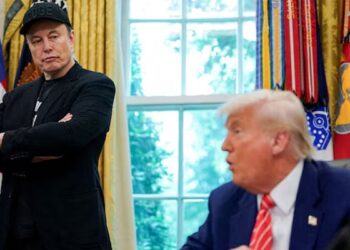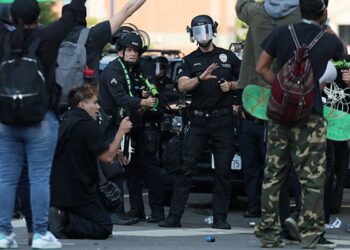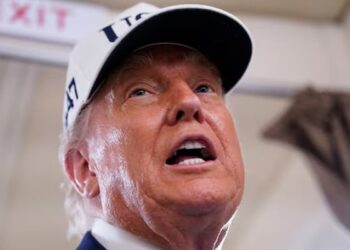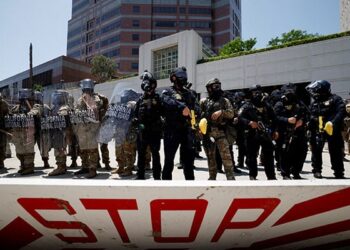- Trump extends presidential authority to near-imperial levels
- “Trump 2.0 is more authoritarian than Trump 1.0,” says political expert
- President initiates an unprecedented attack on global governance.
With Donald Trump resuming his role in the White House, there’s no telling what actions he might take next. Will he insult a foreign leader? Impact the global economy? Take revenge on his adversaries?
Amid all the unpredictability of his initial 100 days back in power, one thing remains clear: he is pushing the limits of U.S. presidential authority to near-imperial levels.
“I think the second term is simply more powerful,” the 78-year-old Republican said at a recent event. “When I give an order, they follow it, right?”
Motivated by lingering grievances from a tumultuous first term that culminated in the disgrace of the January 2021 Capitol riots following his loss to Joe Biden, Trump is on a mission.
While he granted freedom to numerous Capitol rioters on his first day back in office, he is ruthless when it comes to enhancing the power of the presidency.
“Trump 2.0 exhibits a much more authoritarian mindset and takes bolder actions compared to Trump 1.0,” noted political historian Matt Dallek from George Washington University in an interview with AFP.
He’s turned the White House into a continuous reality show, frequently signing executive orders and answering reporters’ questions almost daily.
This barrage of orders has led to an extraordinary onslaught on the fundamental principles of American democracy and global order.
“We haven’t witnessed such a sustained effort to dismantle constitutional safeguards in modern history,” Dallek added.
‘Bold Moves’
In a controversial partnership with Elon Musk, the world’s wealthiest individual, Trump is moving to dismantle a federal government he views as part of a liberal “deep state.”
He has invoked a long-standing wartime law to transport migrants to a massive prison in El Salvador, insinuating that U.S. citizens might soon face similar fates.
He has braced himself for clashes with the judiciary and has pressured law firms involved in past legal troubles to concede to harsh penalties.
Furthermore, he continues to crackdown on the media—referring to it as the “enemy of the people”—and is limiting press access during his administration.
He is also spearheading an ideological purge, eliminating diversity programs and targeting educational institutions, even placing himself at the helm of a respected art center.
Congress, which holds the key authority over governmental finances, has been essentially rendered ineffective. The Republicans have supported his power grab while the Democrats seem unable to formulate an effective opposition.
“We are all concerned,” Republican Senator Lisa Murkowski recently stated.
“The president appears indifferent to established, even constitutional, constraints on his authority,” commented Barbara Trish, a political science professor at Grinnell College.
On the international front, Trump has made territorial assertions over Greenland, Panama, and Canada, claiming a zone of influence reminiscent of Russian President Vladimir Putin’s aggressive tactics.
He finds himself surrounded by a cadre of loyalists, including aides with unconventional viewpoints, such as vaccine-skeptic health secretary Robert Kennedy, who take turns lauding him at cabinet sessions.
“In comparison to his first term, the president is now completely surrounded by advisors who not only enable him but, in some instances, encourage his audacious power plays,” Trish remarked.
‘Instinctively’
However, Trump’s resurgence reveals some familiar patterns.
As he wraps up his first three months, his approval ratings remain lower than those of all post-World War II presidents, with the exception of his own first term, according to Gallup.
The indicators point to the return of the same unpredictable leader who dominated headlines from 2017 to 2021.
His infamous televised confrontation in the Oval Office with Ukrainian President Volodymyr Zelensky—bolstered by hawkish Vice President JD Vance—raised alarms among allies already anxious about his shift towards Russia.
Additionally, Trump’s introduction of sweeping global tariffs was quickly reversed after the measures caused a significant downturn in international markets, which turned out to be a crucial check on his power.
When questioned about his tariff policies, Trump responded, “It was just instinct.”
The pressing question now is whether Trump, who once referred to himself as “THE KING” on his Truth Social platform, will ever be willing to relinquish power.
Recently, he indicated that his repeated mentions of a Constitution-defying third term were “not made in jest.”





